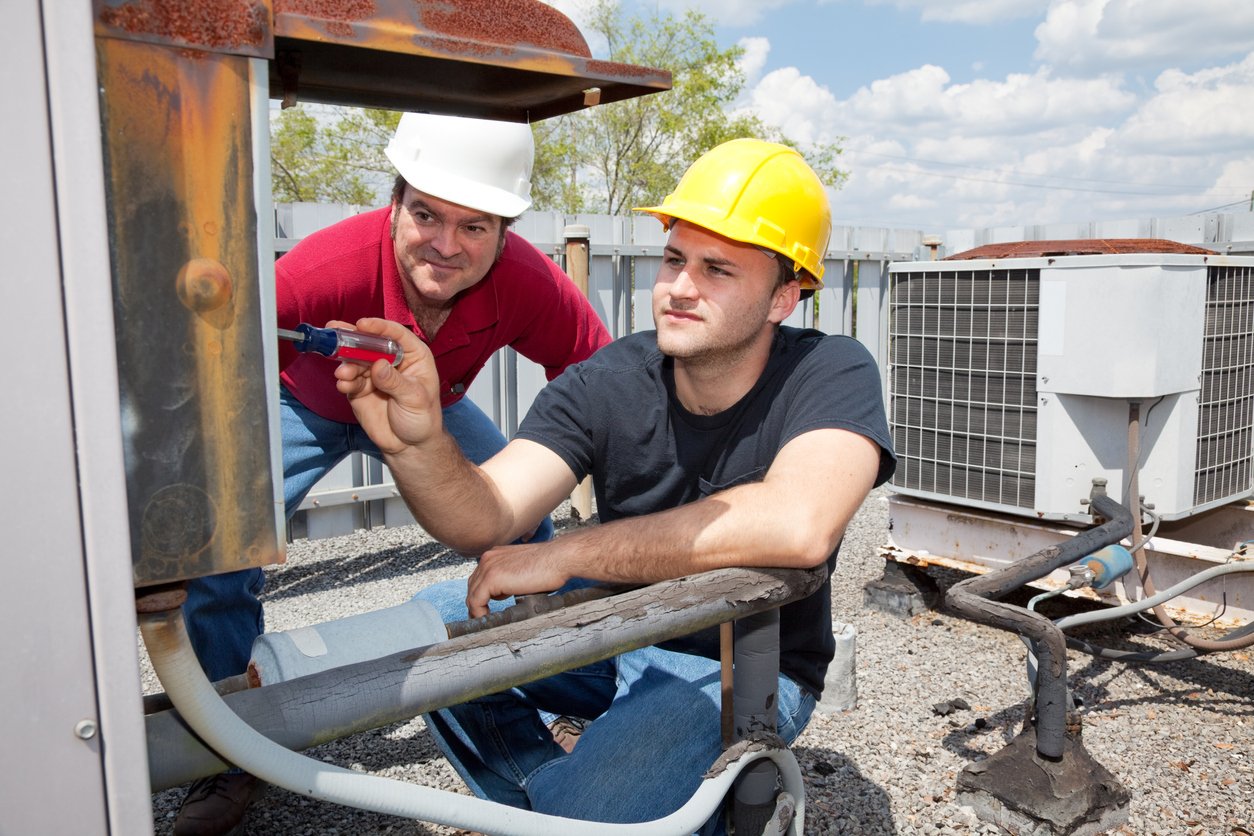If you want to become a certified HVAC technician, getting an HVAC apprenticeship is your first step. HVAC technician is a regulated trade in Ontario, so completing an apprenticeship isn't optional.
It's part of a five-year process of classroom training and on-the-job learning that prepares you for certification.
You need a total of 8,280 apprenticeship hours before you can challenge the exam and become a certified journeyperson in the trade. The good news? Apprentices get paid, so you can earn while you learn.
But competing for good HVAC apprenticeship jobs isn't easy. How do you get an edge?
This week, we interviewed our own HVAC expert, Darren Fearnley, about what it takes to land an HVAC apprenticeship and impress your employer.
Darren's been working in HVAC for over 40 years. He owns an HVAC business and teaches the pre-apprenticeship HVAC program at Herzing College.
In this interview, he explains how to become an HVAC apprentice and get ahead at work.
Q: What kinds of tasks does a first-year HVAC apprentice do?
Darren: As a first-year apprentice, you should expect to do all the hard work and heavy lifting. You'll be running for parts, maintaining truck stock, and doing a lot of cleanup.
The first year of an HVAC apprenticeship is all about character building. I push my apprentices hard to find out who is serious, and who I should let go.
Q: Do you have to complete pre-apprenticeship training to get hired as an HVAC apprentice?
Darren: There's no law that says you have to do an HVAC pre-apprenticeship program. But in today's job market, it really helps give you an edge.
As an HVAC business owner for the past 30 years, I have hired many apprentices. And I would not hire anybody these days that has not completed some level of training.
Quality HVAC pre-apprenticeship training gives you a solid foundation in HVAC installation and job safety.
Our students graduate with six safety certifications, and good working knowledge of heating and air conditioning systems, piping methods, installation, and diagnostics.
The safety training alone saves me thousands of dollars. As an employer, I would have to pay for my apprentice to get that training.
Q: What are the top five qualities employers look for when hiring an HVAC apprentice?
Darren: The qualities I look for are teamwork, being a self-starter, teachability, positive attitude, and punctuality. You're there to learn, work hard, and prove that you're a good addition to the team.
Q: What mistakes do new apprentices make that can lead to getting fired?
Darren: There are a few things that really make me lose confidence in an HVAC apprentice. The first is being late or not showing up.
Other big mistakes include talking and texting during work hours, and not paying attention to instructions. It's a problem if I have to repeatedly demonstrate the same task over and over.
Also, standing around between tasks is a bad sign. A good HVAC apprentice knows how to look around and see what needs doing. They're proactive.
Q: Is there a probation period at the start of the job?
Darren: Almost every job requires a three-month probation period. If you want to keep your HVAC apprenticeship, you really need to prove yourself during those first three months.
This is when the employer is assessing your strengths, weaknesses, and overall fit with the team.
Q: Do most students end up completing their apprenticeship and getting their HVAC certification?
Darren: All my students plan to complete their HVAC apprenticeship and earn their certificate of qualification (C of Q). Most are very successful.
I have been teaching for 10 years, and graduates often stop by to tell me they've completed their HVAC apprenticeship and become certified.
Q: What's the biggest advantage of becoming a certified HVAC technician?
Darren: I think the biggest advantage of becoming a tech is steady employment. HVAC is one of the few recession-proof trades. People will always need heating and cooling. There will always be jobs in this field.
Q: Can you get an HVAC job without getting certified?
Darren: If you don't complete an HVAC apprenticeship and get certified, you could work in HVAC sales or as a heat loss/heat gain designer.
Q: How hard is it to get an HVAC apprenticeship?
Darren: There are plenty of job opportunities out there. It comes down to your skills, drive, and whether you have some level of previous training or experience.
At Herzing, we have a career development team that helps HVAC students find job options before they graduate.
We connect them with employers, help them with their resume, and prepare them for interviews. It's all part of the HVAC pre-apprenticeship program.
Check out another great interview with Darren: Meet Darren Fearnley - Your Expert Guide to HVAC Training
Learn more about HVAC training & careers
Herzing College offers a 52-week HVAC pre-apprenticeship program. Training includes preparation for Gas Technician 3 and 2 exams, and six different safety certifications.
Successful graduates finish the program with a G2 licence and the skills to construct a fully operational heating and cooling system.
If you're interested in learning more, your next step is to speak with admissions. An admissions advisor will answer questions about training, careers, financial aid, how to apply, and more.
Chat live with an advisor now. Or click below to explore the HVAC program in more detail. Your HVAC career starts here!






